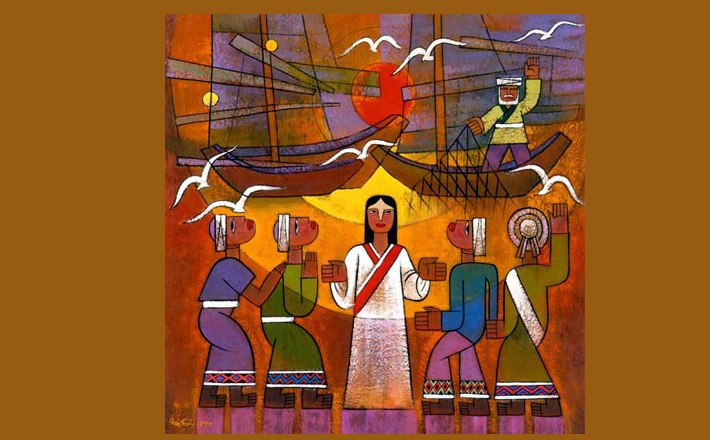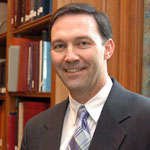Commentary on Psalm 27:1, 4-9
As much as any psalm in the Psalter, Psalm 27 expresses trust in the lord and claims absolute dependence on God.
This is apparent in verse 1, which begins the lectionary reading: “The Lord is my light and my salvation; whom shall I fear? The Lord is the stronghold of my life; of whom shall I be afraid?”
The psalm is a prayer for help. It presumes the psalmist is in some type of trouble (verses 7, 9, 12). Psalms of this type typically contain petition, complaint, and expressions of trust (see Psalm 13 as an example). Psalm 27 is unique in its heightened emphasis on trust.
The opening verse describes the Lord with language that suggests his presence is life-giving and protective. As James Luther Mays says, “The Lord is called ‘light’ because light drives darkness away.”1 Light is a basic category of order and stability that recalls the first act of creation (Gen 1:3; see Exodus 10:21). It is possible that the psalmist perceived and experienced God’s appearance and presence (God’s “face;” verse 8) via sunlight that shone into the temple and reflected off gold decorations (1 Kings 6:20). The reference to God as light (and to God’s face) thus makes the psalm particularly appropriate for the season of epiphany, the celebration of the manifestation of God’s presence.
Israel knew God as “salvation” and celebrated that identity in the aftermath of the exodus from Egypt (Exodus 15:2). “Stronghold” is a common description of God in the Psalms (Psalm 18:2). The metaphor derives from military situations in which a well-positioned fortress with strong walls provided safety from enemy assaults. These images suggest, therefore, that whatever trouble plagues the psalmist, the Lord’s protection is sufficient to protect the psalmist from it. In times of trouble the natural impulse is to flee to a place of safety (see Psalm 11:1-3 for an expression of that sentiment), but Psalm 27 declares the Lord is the “place.”
Verses 2-3 continue the statement of confidence that began in verse 1. The lectionary reading, however, skips to verse 4. The reason for omitting verses 2-3 is not clear, but verse 4 is certainly worthy of attention. It sums up the faith embedded in the psalm with the declaration, “One thing I asked of the lord, that will I seek after: to live in the house of the lord all the days of my life, to behold the beauty of the lord and to inquire in his temple.” Here the psalmist identifies the place of God’s protection and shelter as the central sanctuary in Jerusalem.
This identity is evident in the way verse 4 pairs the general expression, “house of the lord” (see also Psalm 23:6) with the specific term, “temple” (hekal). An additional expression “in his tent” here and in verse 6 has the same meaning. This is a poetic name for the temple that conjures images of both protection and intimacy. A tent does not have multiple rooms as permanent structures do. Therefore, the guest in the tent of another naturally participates in the life of those who dwell there (see Psalm 61:4).2
The terms “seek” and “inquire” suggest the presence of a prophet or other cultic official who gave oracles to worshippers who “sought” them. For the psalmist, this is no mere utilitarian practice; the word of God was not something sought simply to gain success in life (compare the kings seeking an oracle in 1 Kings 22:5, 7). Rather, the psalmist’s only desire is to be in God’s presence and to allow God’s word to direct his life.
This remarkable claim of singular desire for God’s presence is similar to the statement in Psalm 23:1b (“I shall not want”) to the effect that the lord’s guidance provides all that is needed for life. The psalm actually petitions God for more, namely for deliverance from an enemy’s false accusations (verse 12), but it suggests that such deliverance comes under the care of God’s sheltering protection. Psalm 27 thus invites the reader to live into such trust that is complete and comprehensive.
Verse 5 continues to express confidence in the Lord’s protection with further descriptions of the safety of the temple. The images continue and expand on the notion of God as stronghold. The psalmist speaks of safety in terms of being hidden, covered, and placed “high on a rock.” “Stronghold” (verse 1b), “shelter” (verse 5a), “cover of his tent” (verse 5a), and “rock” (verse 5b) are expressions related to the overarching notion of refuge that appears so often in the Psalms (Psalms 2:12; 16:1; 18:1-3[2-4]; 31:1[2]; 34:8[9]; 91:1-2; 142:5[6]). That is, the psalmist here and elsewhere speaks of God as a hiding place, a shelter from the storms of life. For other expressions of these images in the Psalms see especially Psalms 61:2b-4 and 63:7.
In verse 6 the psalmist declares the intention to worship with song and sacrifice in response to God’s salvation. But then the psalm turns to complaint and petition for the rest of the lectionary reading and for the rest of the psalm (verses 7-14). The sharp break between verses 6 and 7 has led some scholars to conclude that the two main portions of the psalm were originally separate psalms.
Nevertheless, verses 1-6 and 7-14 hold together around themes of salvation (verses 1, 9), enemies (verses 2-3, 12), trust (verses 3, 14) and seeking God (verses 4, 8). The psalm closes with petitions that draw upon the language of trust earlier in the psalm: “seek his face” (verse 8 [see verse 4]); “O God of my salvation” (verse 9; see verse 1). Thus, as Mays points out, “the two parts of the psalm are one more way in which the Psalter teaches how closely related are trust and need.”3
Notes:
- James Luther Mays, Psalms (Interpretation: A Bible Commentary for Teaching and Preaching; Louisville: Westminster John Knox Press, 1994), p. 133.
- Frank-Lothar Hossfeld and Erich Zenger, Psalms 2: A Commentary on Psalms 51-100 (Hermeneia; trans. Linda M. Maloney; Minneapolis: Fortress Press, 2005), p. 108.
- Mays, Psalms, p. 132.


January 22, 2017